
|
The purpose of the monthly Spotlight is to showcase health communication materials that have had proven impact.
|
|
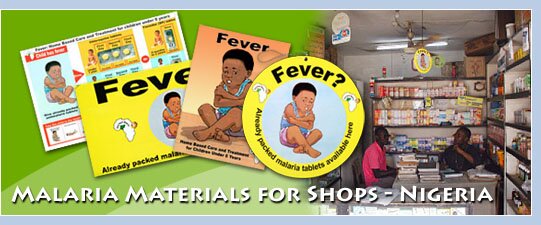 |
MALARIA MATERIALS FOR SHOPS - NIGERIA
A number of studies have shown that up to 82% of the population in Nigeria choose to first consult private drug shops and informal providers for advice about and assistance with treatment of childhood illnesses, including malaria. It has also been found for private shops that a large percentage of the drugs provided or dosages given, or both, are inappropriate, indicating the need for innovative and effective approaches to achieve rational prescribing practices. The Ministry of Health (MOH) in Nigeria, in collaboration with partners, designed approaches to utilize patent medicine vendors (PMVs) for delivery of basic child survival strategies and products to those populations less served by the public sector.
The Nigeria intervention was an integrated effort that included coordination of PMV training with the introduction of pre-packaged, age-specific Chloroquine and Sulfadoxine-Pyrimethamine in Abia State . Both of these activities were supported by a comprehensive social marketing and behavior change communication strategy, which included mass media to promote new pre-packaged antimalarials and the PMVs who displayed shop identifiers from the training. Both of the components also benefited from routine community-based activities on home management of malaria as part of the broader MOH malaria strategy.
The partners produced communication support materials for use by PMVs. Materials included shop identifiers and communication materials such as job aids. Upon completion of the training, each PMV trainee received a set of the following items:
|
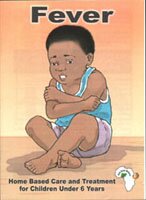 Fever: Home Based Care and Treatment of Children Under 6 Years Fever: Home Based Care and Treatment of Children Under 6 Years
(8-page caregiver manual)
(100 copies)
« Click image to view PDF
|
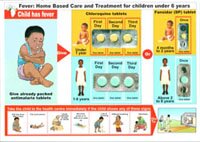 Guide for home based malaria treatment Guide for home based malaria treatment
(1page fever card)
(100 copies)
« Click image to view PDF
|
|
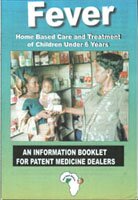 Fever: Home Based Care and Treatment of Children Under 6 Years: An Information Booklet for Patent Medicine Dealers Fever: Home Based Care and Treatment of Children Under 6 Years: An Information Booklet for Patent Medicine Dealers
(12-page booklet)
(2 copies )
« Click image to view PDF
|
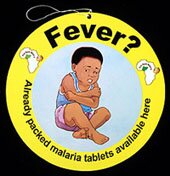 Logo (dangler) for identifying the shop of one who has completed the course Logo (dangler) for identifying the shop of one who has completed the course
(1)
|
|
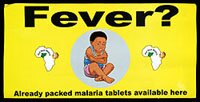 Shop sticker with the above logo to place outside the shop Shop sticker with the above logo to place outside the shop
(1)
|
Certificate containing a pledge for performance
(1)
|
EVIDENCE OF IMPACT
Data collection was carried out immediately prior to the PMV intervention in July 2003, and then in January 2004, over four months after the majority of PMVs had been trained. The pre-and post-intervention surveys included two types of data collection. The first was a simulated visit approach using mystery clients to measure changes in PMV practices. The second method was an inventory of the drugs available. This also included a profile of shop attendants, a structured interview to measure knowledge about management of malaria in children, and observations of the presence of intervention communication materials. The survey showed that there was a strong uptake of pre-packaged antimalarials (PPAMs) and that 96% of the PMV shops were displaying at least one of the three materials distributed at the training in full view. The shop dangler was the most commonly seen (79%), followed by shop stickers (69%) and the dosage chart for PPAMs (65%).
View a full report.
CREDITS
The overall concept and design of the project were laid out in discussions between the Abia State Ministry of Health and BASICS II, a global child survival project funded by the Office of Health and Nutrition of the Bureau for Global Health of the U.S. Agency for International Development. This was expanded to include the teams of the Society for Family Health/Population Services International (SFH/PSI) and the Health Communication Partnership (HCP) based at the Johns Hopkins Center for Communication Programs. BASICS II played the leading role in the design, logistics, and implementation of the PMV training and in conducting evaluation surveys; SFH developed and introduced pre-packaged CQ and SP and launched these products in Abia State; HCP played the leading role in development and production of communication and training materials.
 See resources for Malaria See resources for Malaria
Back to M/MC Home
|



